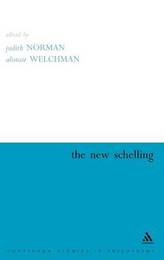
|
The New Schelling
Hardback
Main Details
| Title |
The New Schelling
|
| Authors and Contributors |
Edited by Judith Norman
|
|
Edited by Alistair Welchman
|
| Physical Properties |
| Format:Hardback | | Pages:230 | | Dimensions(mm): Height 234,Width 156 |
|
| Category/Genre | Western philosophy - c 1600 to c 1900 |
|---|
| ISBN/Barcode |
9780826469410
|
| Classifications | Dewey:193 |
|---|
| Audience | | General | | Professional & Vocational | | Tertiary Education (US: College) | |
|---|
|
Publishing Details |
| Publisher |
Bloomsbury Publishing PLC
|
| Imprint |
Continuum International Publishing Group Ltd.
|
| Publication Date |
1 April 2004 |
| Publication Country |
United Kingdom
|
Description
Friedrich Wilhelm Joseph Von Schelling (1775-1854) was a colleague of Hegel, Holderlin, Fichte, Goethe, Schlegel, and Schiller. Always a champion of Romanticism, Schelling advocated a philosophy which emphasized intuition over reason, which maintained aesthetics and the creative imagination to be of the highest value. At the same time, Schelling's concerns for the self and the rational make him a major precursor to existentialism and phenomenology. Schelling has exercised a subterranean influence on modern thought. His diverse writings have not given rise to a system or school of thought; rather, individual philosophers have been influenced by the resonance of his ideas and their influence on contemporary ideas and movements. The New Schelling brings together a wide-ranging set of essays which elaborate the connections between Schelling and other thinkers - such as Marx, Nietzsche, Freud, Sartre, Deleuze, and Lacan - and argue for the unexpected modernity of Schelling's work.
Author Biography
Judith Norman lectures at Trinity University in Texas. Alistair Welchman has studied philosophy, politics and cognitive science at the University of Oxford, Warwick and Sussex. Alistair Welchman is Assistant Professor of Philosophy at the University of Texas at San Antonio, USA. He is the co-translator of Schopenhauer's World as Will and Representation (CUP, forthcoming).
Reviews"Over the past few years Schelling has shot from Teutonic obscurity to something like philosophical stardom" Terry Eagleton."
|